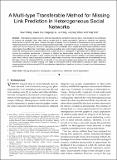Files in this item
A multi-type transferable method for missing link prediction in heterogeneous social networks
Item metadata
| dc.contributor.author | Wang, Huan | |
| dc.contributor.author | Cui, Ziwen | |
| dc.contributor.author | Liu, Ruigang | |
| dc.contributor.author | Fang, Lei | |
| dc.contributor.author | Chen, Junyang | |
| dc.contributor.author | Sha, Ying | |
| dc.date.accessioned | 2023-01-06T12:30:11Z | |
| dc.date.available | 2023-01-06T12:30:11Z | |
| dc.date.issued | 2023-11-01 | |
| dc.identifier | 282816591 | |
| dc.identifier | a6fc9a77-8d80-4f8e-88a3-fe2af3c01c21 | |
| dc.identifier | 85147209995 | |
| dc.identifier.citation | Wang , H , Cui , Z , Liu , R , Fang , L , Chen , J & Sha , Y 2023 , ' A multi-type transferable method for missing link prediction in heterogeneous social networks ' , IEEE Transactions on Knowledge and Data Engineering , vol. 35 , no. 11 , 10004751 , pp. 10981-10991 . https://doi.org/10.1109/TKDE.2022.3233481 | en |
| dc.identifier.issn | 1041-4347 | |
| dc.identifier.uri | https://hdl.handle.net/10023/26701 | |
| dc.description | Funding: This work is supported by the National Natural Science Foundation of China (62006089, 62272188, 62102265), Nature Science Foundation of Hubei Province (2020CFB168), Open Foundation of Henan Key Laboratory of Cyberspace Situation Awareness (HNTS2022032), the Open Research Fund from Guangdong Laboratory of Artificial Intelligence and Digital Economy (SZ) (No. GML-KF-22-29), the Natural Science Foundation of Guangdong Province of China under Grant No. 2022A1515011474, and Independent Science and technology Innovation Fund project of Huazhong Agricultural University (2662019QD047). | en |
| dc.description.abstract | Heterogeneous social networks, which are characterized by diverse interaction types, have resulted in new challenges for missing link prediction. Most deep learning models tend to capture type-specific features to maximize the prediction performances on specific link types. However, the types of missing links are uncertain in heterogeneous social networks; this restricts the prediction performances of existing deep learning models. To address this issue, we propose a multi-type transferable method () for missing link prediction in heterogeneous social networks, which exploits adversarial neural networks to remain robust against type differences. It comprises a generative predictor and a discriminative classifier. The generative predictor can extract link representations and predict whether the unobserved link is a missing link. To generalize well for different link types to improve the prediction performance, it attempts to deceive the discriminative classifier by learning transferable feature representations among link types. In order not to be deceived, the discriminative classifier attempts to accurately distinguish link types, which indirectly helps the generative predictor judge whether the learned feature representations are transferable among link types. Finally, the integrated is constructed on this minimax two-player game between the generative predictor and discriminative classifier to predict missing links based on transferable feature representations among link types. Extensive experiments show that the proposed can outperform state-of-the-art baselines for missing link prediction in heterogeneous social networks. | |
| dc.format.extent | 11 | |
| dc.format.extent | 1205031 | |
| dc.language.iso | eng | |
| dc.relation.ispartof | IEEE Transactions on Knowledge and Data Engineering | en |
| dc.subject | Missing link prediction | en |
| dc.subject | Heterogenous social network | en |
| dc.subject | Transferable feature representation | en |
| dc.subject | QA75 Electronic computers. Computer science | en |
| dc.subject | QA76 Computer software | en |
| dc.subject | NDAS | en |
| dc.subject | MCC | en |
| dc.subject.lcc | QA75 | en |
| dc.subject.lcc | QA76 | en |
| dc.title | A multi-type transferable method for missing link prediction in heterogeneous social networks | en |
| dc.type | Journal article | en |
| dc.contributor.institution | University of St Andrews. School of Computer Science | en |
| dc.identifier.doi | https://doi.org/10.1109/TKDE.2022.3233481 | |
| dc.description.status | Peer reviewed | en |
This item appears in the following Collection(s)
Items in the St Andrews Research Repository are protected by copyright, with all rights reserved, unless otherwise indicated.

